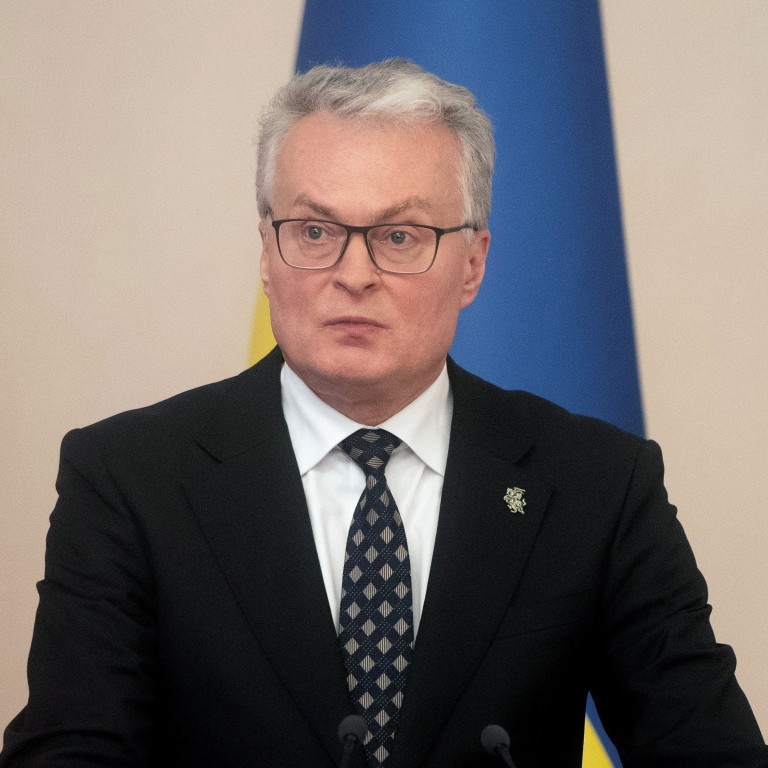
Carrot vs stick: Taiwan and China’s row over Lithuania leads to political brawl in Vilnius
- Taipei says it will set up a US$200 million investment fund for Lithuanian industries, while Beijing seeks Vilnius’ retreat on ‘Taiwanese Representative Office’
- Both responses follow remarks by Lithuanian President Gitanas Nauseda that allowing that official name had been ‘a mistake’
The new year has begun with a familiar saga: Taipei and Beijing’s tug of war over Lithuania has rumbled into 2022.
An unofficial mainland Chinese blockade of Lithuanian-made goods and components continued this week, according to business leaders in Vilnius, dividing political and public opinion as to the wisdom of permitting the opening of a “Taiwanese Representative Office” in the capital.

The row has ignited domestic political rifts in the Baltic state, and exposed the European Union’s limited options in defending a member from alleged economic bullying by Beijing, which has been infuriated by the affair.
Beijing considers the self-ruled island of Taiwan a wayward province that eventually must reunite with the mainland, by force if necessary.
Lithuanian President Gitanas Nauseda on Tuesday said that the naming of the de facto embassy had been “a mistake”, even if the country was right to host a Taiwanese mission of some sort.
China downgrades ties with Lithuania after Taiwan opens de facto embassy
He also complained that he had not been consulted on the move – a charge Foreign Minister Gabrielius Landsbergis denied on Wednesday. Landsbergis said the president had been consulted all along.
Nauseda’s apparent buyer’s remorse has drawn markedly different responses from Beijing and Taipei.
On the one hand, a carrot from Taipei arrived on Wednesday in the announcement by the Taiwanese Representative Office of a US$200 million investment fund earmarked for Lithuanian industries, including semiconductors – a sector crucial to the EU’s ambitious industrial upgrade.
“We will establish the fund as soon as possible and we hope this year we will have some tangible results … I can imagine the first top priorities will be semiconductor, laser [and] biotechnology,” Reuters quoted Eric Huang, head of the office, as saying.
Late last year, a delegation of Taiwanese businesses toured Lithuania and discussed building a silicon processing plant to make microchips, according to a person who was present.
Lithuania produces rare high-grade quartz sand that is vital to production of the chips, which are essential for key technologies from smartphones to electric vehicles.
As part of the European Chips Act launched last autumn, the EU aims to produce 20 per cent of the world’s semiconductors by 2030, doubling its own output.
On the other hand, Beijing wielded the stick, saying that Nauseda’s words were not enough.
“Recognising a mistake is a step in the right direction, but more importantly, action must be taken,” a Chinese foreign ministry spokesman said in Beijing.
“Giving excuses for one’s own wrong actions does not help solve the problem, nor does it help improve China-Lithuania ties.”
China approves of Lithuanian reflection on Taiwan office name ‘mistake’
Nauseda’s remarks sparked a war of words in Vilnius, where high-profile officials condemned the president, who has constitutional authority over foreign policy.
In a post on her Facebook page, the deputy speaker of the Parliament, Radvilė Morkūnaitė, from the senior coalition party Homeland Union, accused Nauseda of being “consistent in his inconsistency”.
Speaker Viktorija Cmilyte-Nielsen, from the junior partner, the Liberal Party, accused the president of flip-flopping under Beijing’s vociferous reaction.
“Somehow I heard little criticism of the decisions in the first months after they were taken. In August, in September, there was no talk of it. Only now, when such a background is more tense, are there more doubtful voices,” she told local media.
Nauseda had backed the move in earlier interviews and at various EU summits, where he sought support from Brussels and member states.
US Secretary of State Antony Blinken and German Foreign Minister Annalena Baerbock discussed Lithuania during a meeting in Washington on Wednesday, telling reporters afterwards that they remained firmly on the Baltic nation’s side.
“This isn’t just about Lithuania, but about how every country in the world should be able to determine its own foreign policy, free from this kind of coercion,” Blinken said.

Baerbock reiterated calls for an EU ban on Chinese goods made using forced labour.
“And the same holds true when it comes to solidarity for Lithuania. We as Europeans stand in solidarity at Lithuania’s side,” Baerbock said.
And in a phone call on Wednesday, US trade representative Katherine Tai and Landsbergis said the two nations would stay in regular communication to strengthen their economic relationship.
“Ambassador Tai emphasised the US commitment to working with the European Union and its member states to address coercive diplomatic and economic behaviour,” the US trade representative said in a statement.
The two officials said the US-EU Trade and Technology Council could play a part in addressing their “shared challenges”.
“Ambassador Tai and Minister Landsbergis both noted that the United States and the EU, as democratic market economies, share a number of core values and principles that we need to defend internationally,” the statement said.
Chinese foreign ministry spokesman Wang Wenbin hit back on Thursday, saying the US was using Taiwan to suppress Beijing.
“We demand the US to abide by the one-China principle,” Wang said. “We also want to tell Taiwan that its money diplomacy will not alter the fate that Taiwan independence is doomed to fail. There will only be dead end if Taiwan continue the path of independence with foreign support”.
Lithuania seeks more EU support in Taiwan row after US stumps up $600m
While Brussels has offered strong rhetorical backing to Vilnius, officials admit privately there is little they can do in the short term to counter Beijing’s behaviour.
The EU’s trade department is gathering evidence for a potential World Trade Organization lawsuit that could take months if not years. A proposed anti-coercion measure to respond to such confrontations is still in development.
Keen for a detente, some European diplomats were this week privately scratching their heads over Vilnius’ continued stance, even as they offered public backing for a fellow EU member.
Sven Biscop, director of the Egmont Royal Institute for International Relations in Brussels, suggested that one compromise Lithuania could offer would be to change the name of the Taiwan office, but keep its doors open.
“Compromise in society should not be seen as a loss of face, because then nobody ever backs down,” Biscop said.
Beijing’s furious backlash has struck a nerve in Lithuania: a survey at the end of November found that just one-third of Lithuanians supported the policy towards China and Taiwan, while more than 40 per cent opposed it.
Still, rather than serious differences over the Taiwan office itself, the dispute “is 100 per cent an issue of domestic politics”, said Marius Laurinavičius of the Vilnius Institute for Policy Analysis.
“This is a long-running confrontation between the president, the foreign ministry and the prime minister and it is not the first time it has become nasty,” he said.
US and Taiwan officials discuss chips, Lithuania in economic dialogue
Last year, for example, the government tried to replace Nauseda, a political independent, at the European Council – a gathering of the leaders of all 27 member states – with Prime Minister Ingrida Šimonytė, of the conservative governing Homeland Union.
Lawmakers said that while the public dispute was unseemly, they did not expect the office to be renamed.
“Democracy can be messy. Our minister of foreign affairs and president are not best buddies, but there is nothing special in that,” said Dovilė Šakalienė, a Social Democrat MP who was sanctioned by Beijing last year.
“This domestic brawl will not change the direction on foreign and security policy on relations with China or Taiwan,” she predicted.
Additional reporting by Jacob Fromer

